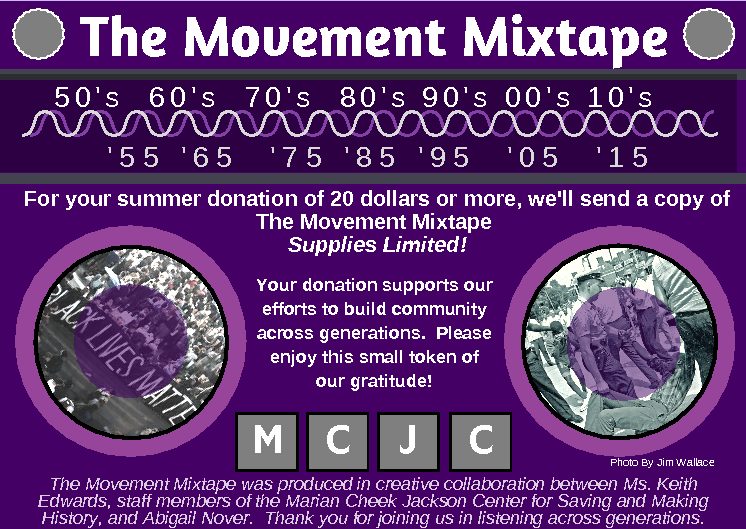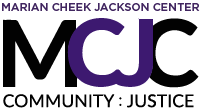

In the wake of back-to-back days of violence against black bodies in the summer and fall of 2016—Alton Sterling in LA, Keith Lamont Scott in NC, Philando Castile in MN, Terence Crutcher in OK—Jackson Center staff members, George Barrett and Brentton Harrison, were looking for answers: How do we deal with the recurring cycle of pain, anger, and numbness? How do we as black people survive this open season of hatred? We knew that the people who could guide us through a time like this were people who had lived through and fought hard against racial injustice. So we found ourselves at the home of a local hero, native Northside resident, and Civil Rights leader, Ms. Keith Edwards, looking for advice, wisdom, and comfort. We soon found ourselves talking about the power of music and the unimaginable role that it plays in inspiring and sustaining direct action by activists and changemakers of all kinds. But here’s where things got interesting. Suddenly we shifted from a casual conversation to something more like real dialogue in which each generation played a part.
Ms. Keith offered: “y’all’s generation doesn’t have artists that are making music to address social issues. In our day we had James Brown, Marvin Gaye, Nina Simone—and so many others who made songs that instilled a real sense of hope. So I’m going to make y’all a playlist of songs that inspired the movement during my time.” George responded in frustration: “Sorry, Ms. Keith, but yes we do! Kendrick Lamar, Erykah Badu, and J. Cole are all making music that addresses the social issues of right now and inspires social movements like BlackLivesMatter. So, Brentton and I are going to make you a playlist of songs that instill hope in us.” We listened to each other’s playlist and eventually arrived at this combined version that cuts J. Cole with Marvin Gaye and Nina Simone with Erykah Badu. We wanted to create a mix that brought black justice movements together and reflected the promise of the kind of intergenerational dialogue we found in Ms. Keith’s living room. Here you have it–the Movement Mixtape: a literal mix of change-driving music that we hope carries hope for you.
Join with us in continuing to fight injustice in our communities and beyond.
Yours gratefully,
The Staff of the Marian Cheek Jackson Center for Saving and Making History
For your summer donation of $20 or more, we’ll send you a copy of The Movement Mixtape. Supplies limited! Your donation supports our efforts to build community across generations, so please enjoy this small token of our gratitude. When donating, please leave a comment on whether you intend to pick up the Mixtape during our business hours or if you would like us to send/deliver it to you.
The Movement Mixtape is intended for wide-ranging use in community and classroom education. It represents some of the Jackson Center’s core principles—principles we see as essential both to our mission and to our ultimate aim to build Beloved Community:
Listen. Then listen again. Then listen again.
Work beyond an oppositional politics.
Celebrate.
Criss-cross differences.
The playlist is just a token of these principles at work. Underneath contemporary black justice movements is a smoldering generational gap. Each generation of 1960s and “millennial” leaders wants the other to hear them, to listen to their interests. For some Civil Rights leaders, the younger generation should listen to what they learned and laid down their lives to model. For some BlackLivesMatter leaders: we need a new style, a new commitment, a revolutionary approach to an epidemic of violence. Ms. Keith and Brentton/George faced down that gap. They found a way to listen to each other. They “schooled” each other in their differences with genuine respect and care. They embraced the power of music to move beyond the pro/con, us/them thinking that can drag us all down. And they celebrated doing so with a song mix.
In our Learning Across Generations curriculum that now spans two counties, district and alternative school programs, and home schools, we try to do something similar: to engage students in thinking back and forth across generations especially in order to figure out what and how they can learn from elders while they struggle with contemporary issues of race and class. Music helps. It has an immediate, visceral appeal that can be contextualized, criticized, and enjoyed. It connects students in their efforts to make change. By offering students the opportunity to engage with their elders, to witness back, to conduct oral histories, and to understand current crises of sex, race, class, and faith in the expanse of civil rights history, we hope that they will begin to see themselves as leaders: as young people who can and will stand up and be counted—thoughtfully, imaginatively, and freely–not entirely unlike the young people who led the Freedom Movement in the 60s.
We will be using cuts from the Movement Mixtape in workshops in which we already splice oral history and spoken word poetry, recorded and immediate recollection. We’ll be learning movement music and engaging its power in the classroom—where we expect that it will draw us more deeply yet into learning across generations. For more about the Learning Across Generations initiative, please click here.
Any black male child should have a bodyguard because their life is in danger from the day they are born—and that’s sad.
–Linda Carver, Northside neighbor, Civil Rights leader
